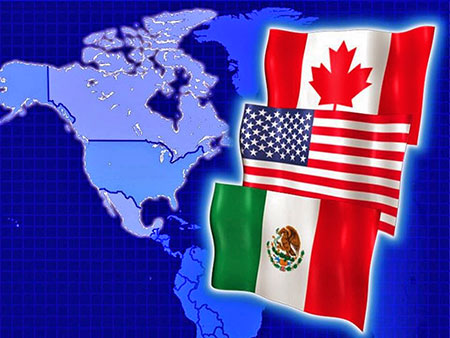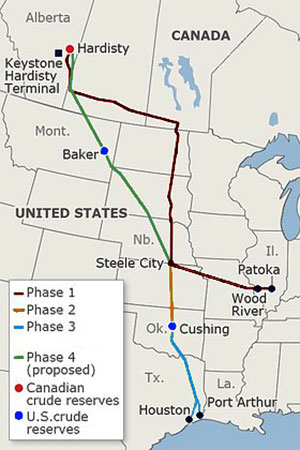|
The pivot to North America would focus on greater trilateral cooperation in areas such as energy, economic competitiveness, border management, law enforcement and continental perimeter security. Throughout the years, the incremental steps towards a North American Union have been used to further chip away at the sovereignty of all three NAFTA countries.
The CFR-sponsored Independent Task Force on North America, co-chaired by retired General David Petraeus and former president of the World Bank Robert Zoellick, recently released their report, North America - Time for a New Focus.
The Task Force maintained that,
They explained that,
The Task Force also described how,
The move by Mexico to open up its energy sector to
private investment, along with increased oil and natural gas
production in Canada and the U.S. are some of the driving forces
behind the renewed push for deeper North American integration.
This includes developing a regional energy strategy and strengthening continental energy infrastructure. The approval of Keystone XL pipeline, which would link Canada's oil sands to U.S. Gulf Coast refineries was also at the top of Task Force to-do list.
Keystone Pipeline System
They acknowledged that,
As part of efforts to move beyond the dispute, both countries have signed a Memorandum of Understanding on Energy Cooperation in areas such as research, regulation and trade.
In an example of the importance that energy issues could play in the upcoming 2016 election, New Jersey Governor Chris Christie, a possible candidate for the Republican presidential nomination gave a speech in September, where he detailed North America's Energy Opportunity.
Not surprisingly, the majority of his policy ideas
were in sync with the CFR's Task Force recommendations.
In a joint statement, the leaders announced that the energy ministers from all three countries will meet later this year,
To help build on the trilateral energy meetings, the Task Force suggested,
The council's responsibilities would include,
Although it has since been disbanded, the
North American Energy Working Group has already laid some of the
groundwork with regards to trilateral energy integration.
This includes,
The Task Force also encouraged,
In addition, they proposed that,
Throughout the report, the Task Force emphasized that,
While they praised the progress that separate U.S.-Canada and U.S.-Mexico initiatives have made, they also pointed out that the continued reliance on some of these bilateral efforts has in many ways,
When it comes to North American regulatory issues, they are currently being managed through two separate bilateral bodies, As part of efforts to foster trilateral regulatory alignment, the Task Force recommended that,
In August, the U.S. and Canada released the RCC Joint Forward Plan, which builds on the initial 2011 Joint Action Plan.
Not only does it deepen cooperation in new areas, but it sets the stage for regulatory departments and agencies in both countries to essentially become permanent bedfellows.
The new regulatory plan also noted that,
This also applies to Canadian officials being able
sit in on the HLRCC meetings. The NAFTA partners are taking steps to
promote trilateral regulatory convergence.
The Task Force stressed that,
Instead, the Task Force favored,
At the Third Annual Beyond the Border Executive Steering Committee,
This is part of efforts to link the two bilateral
border arrangements and to see if lessons can be applied from one
initiative to the other.
The report went on to say,
Some of these security issues are being addressed through the Meeting of North American Defense Ministers, but the Task Force is pushing for more bilateral security initiatives to be expanded trilaterally.
To advance shared continental perimeter security, they proposed that Mexico also be included,
Many of the Task Force recommendations would further
lay the foundation for a fully integrated North American security
perimeter.
They referred to themselves as North Americans and stated how,
During his visit to Canada, U.S. Secretary of State John Kerry also expressed his condolences and pledged to further strengthen both countries security relationship in the fight against terrorism.
At a joint press conference with Foreign Minister John Baird, Secretary Kerry pointed out that the U.S. and Canada would,
Now might be the perfect opportunity for both countries to finally unveil the Next Generation pilot project, which was scheduled to be launched back in 2012.
The joint policing initiative is a component of the Beyond the Border Action Plan and would allow teams of cross-designated officers to operate on both sides of the border in areas such as intelligence and criminal investigations.
According to an RCMP memo, it has been delayed due to a U.S. request that its agents be exempt from Canadian law, which has raised serious concerns regarding sovereignty and police accountability.
The bilateral program is part of the process of
further acclimating joint law enforcement operations in North
America.
The door has also been opened for even deeper North American integration in the areas of border security, counter-terrorism and law enforcement, which could require further merging security and intelligence sharing practices with the Department of Homeland Security.
An increased continental approach to security could serve to bind North America into a single foreign policy entity.
|


